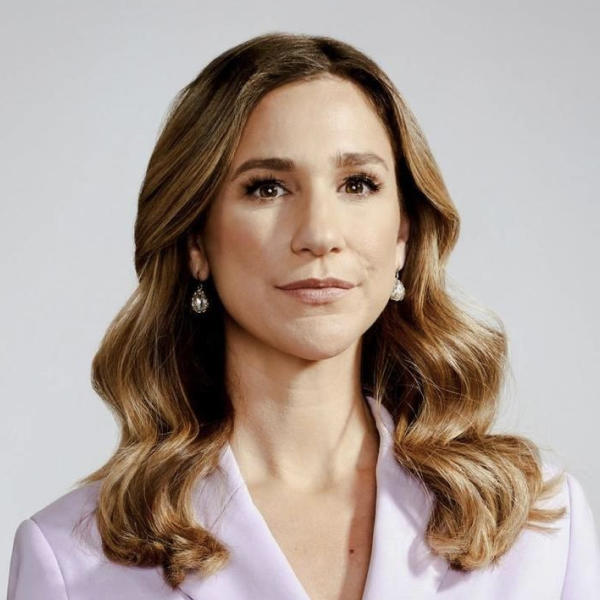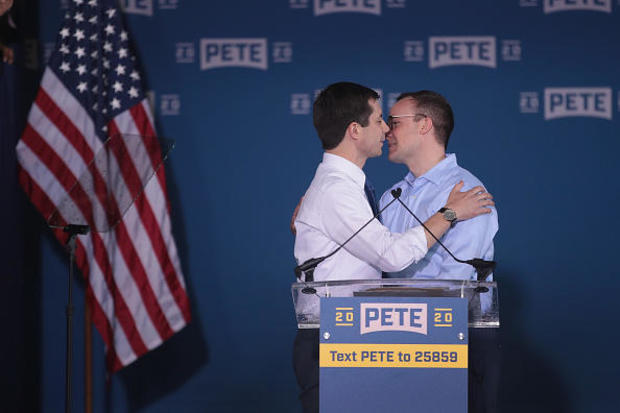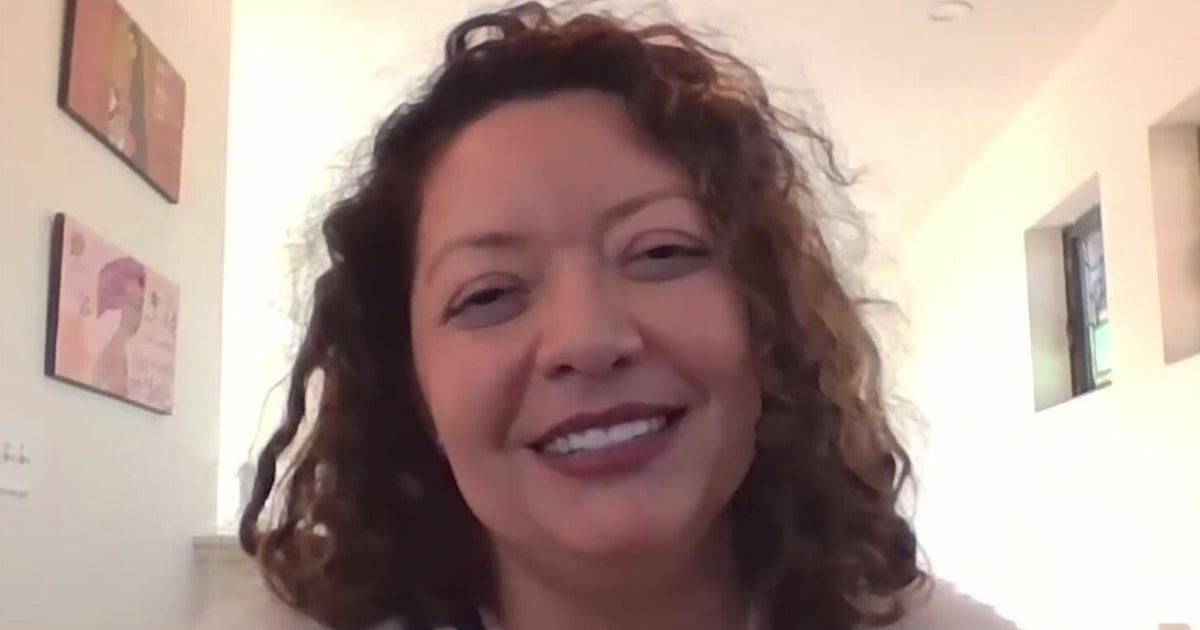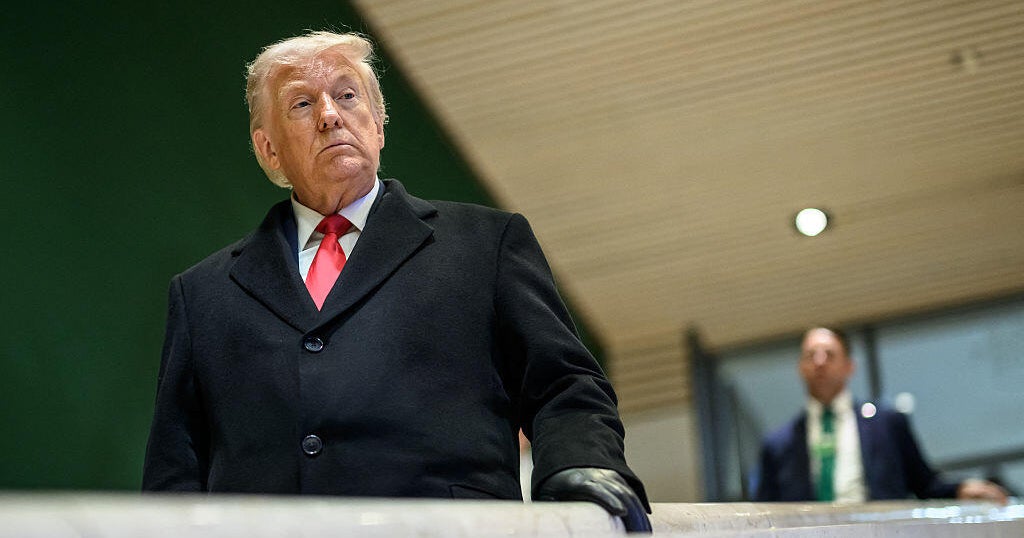God, guns and gays: The old third rails of politics take center stage in 2020 campaign
Kamala Harris and Cory Booker have proposed sweeping gun control legislation. Elizabeth Warren quoted from the Gospel of Matthew during a televised town hall. Pete Buttigieg appeared on the cover of Time magazine with his husband, and has said their relationship brought him "closer to God."
In the 2020 presidential primary, candidates are embracing topics that were once considered taboo in politics, and liabilities for the party in a general election. But significant shifts in public opinion combined with rhetoric and policy in the Trump administration have Democrats eager to talk about so-called social issues on the campaign trail.
"The Trump presidency has really put values front and center," says Democratic pollster Celinda Lake. "There really is a fight for the soul of the nation in Democrats' minds."
Democrats say that the significant shifts in public attitudes, particularly on guns and marriage, allow the party to play offense on these issues.
"These are not the third rail issues that they once were and Democrats are now comfortable proactively discussing these topics as voting issues," says Democratic strategist Joel Payne. "LGBT rights and gun control are no longer the 'toxic' culture war issues for Republicans to exploit Democrats with — Republicans lost the high ground on these issues with voters."
In 2012, Vice President Joe Biden went off script to voice support for same sex marriage, getting out ahead of President Obama who had not yet gone that far. Seven years later, Buttigieg kissed his husband on stage after announcing his candidacy for president. In April, a NBC/Wall Street Journal poll found that 68 percent of Americans were fine with a gay president.
In an interview Thursday with Fox News, Mr. Trump said it was "great" to see a gay candidate share the stage with his husband. "It's something that perhaps some people will have a problem with it," he said. "I have no problem with it whatsoever. I think it's good."
In February, a year after the high school shooting in Parkland, Florida, a CBS News poll found that 56 percent of Americans think laws covering gun sales should be more strict, including 51 percent of independents. Most of the 2020 Democratic candidates support a ban or restrictions on assault-style weapons. Even Montana Gov. Steve Bullock, who entered the race this week, said he would support a ban on some semi-automatic weapons. And Harris and Booker have released policy proposals that would restrict gun ownership.
"The politics have fundamentally changed," Peter Ambler, executive director of the gun control advocacy group Giffords, told CBS last month. "It's become a threshold, litmus test issue for Democrats."
While the issues haven't changed dramatically for Democrats since 2016, party strategists say the difference is that they may be less of a liability in the general election than before.
"It shows more how the American people have evolved," says former Pennsylvania Gov. Ed Rendell, who is supporting Biden in the primary. "Anyone who was going to vote against Pete for kissing his partner wasn't going to vote for a Democrat anyway."
"There's not danger on the social issues," Rendell said. "The only thing we have to worry about is over promising, so that the Republicans can say they [Democrats] are turning this country socialist and causing taxes to go up."
As much as Democrats are becoming more comfortable addressing cultural issues on the campaign trail, party strategists also urge caution.
"The one challenge is that the biggest deficit they have is not on these kinds of issues but on economics," says Lake. Democrats "have to make sure that having this conversation does not get in the way of providing an economic alternative."
Republicans have been quick to criticize the Democrats' gun policies this cycle, a signal that the issue is still politically fraught.
If guns and gay rights have a particular rallying effect among the base of the party, Democrats say that in talking about religion and faith, candidates have an opportunity to reach voters outside their traditional constituency — particularly by drawing a contrast to Mr. Trump on immigration policy and climate change.
"It's about making sure you're in the best position to make sure Trump doesn't get reelected and an essential piece of that is having a candidate who can reach the diverse faith communities to recapture the losses we saw," says Michael Wear, who directed faith outreach for the Obama campaign. "If Democrats win in 2020, the president is going to have a responsible to bring this country together, to heal from the immortality, and that's going to require the faith community."
Buttigieg, the mayor of South Bend, has been among the most outspoken about his faith on the campaign trail. In a televised town hall earlier this year that helped to catapult him to the national stage, Buttigieg called Vice President Mike Pence a "cheerleader for the porn star presidency."
When asked about faith and politics in another town hall last month, Buttigieg said "part of where I'm coming from is a faith tradition that counsels me to be as humble as possible, that counsels me to look after those who need defending. And frankly, it couldn't be more radically different than what I see certainly in this White House."
Warren said that faith guided her political views. In a televised town hall in April, she quoted scripture. "And the shepherd, the Lord, answers back by saying, 'I was hungry, and you gave me food. I was thirsty, and you gave me water,'" she said. "And what I hear in that is two things that guide me every day...there is God, there is value in every single human being."
Booker, a New Jersey senator, has often quoted scripture on the campaign trail. In a CNN town hall last month, Booker quoted both the Torah and the Bible. "Christ is the center of my life," he said. "I believe that the Bible talks more about poverty, about greeting the stranger, about being there for the convicted far more than it talks about the kind of toxic stuff you often hear the president spewing out there. And our immigration policy violates not only American values, but the values of our faith traditions."
And Joe Biden, a Catholic, has cast the 2020 campaign as "the battle for the soul of our nation."
Religion and faith "may play an even larger role this cycle given the outsized importance of the African-American vote, especially in the South, and the centrality of faith to many older black voters who will be critical to determining the next Democratic nominee," says Payne, the Democratic strategist.







